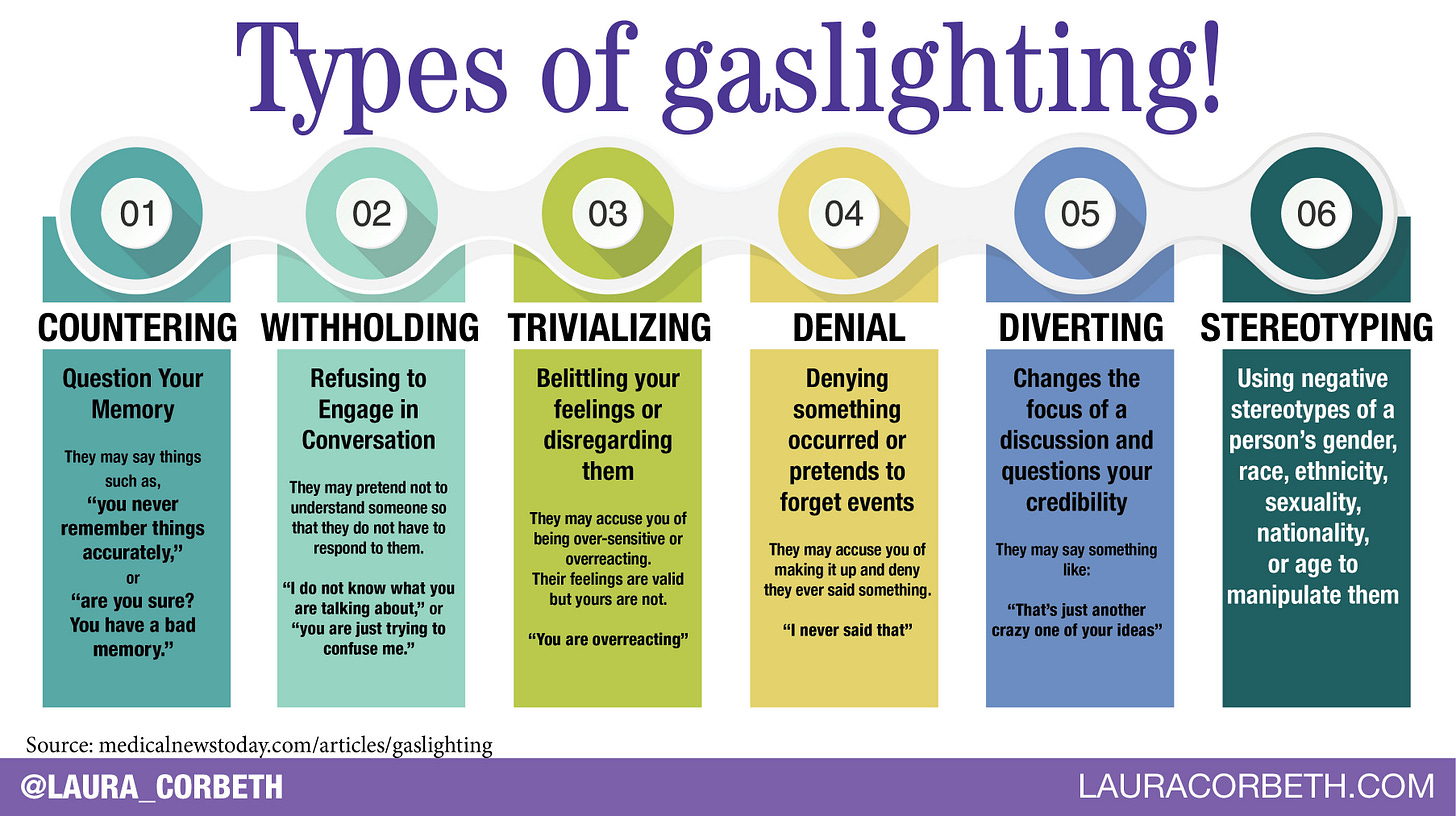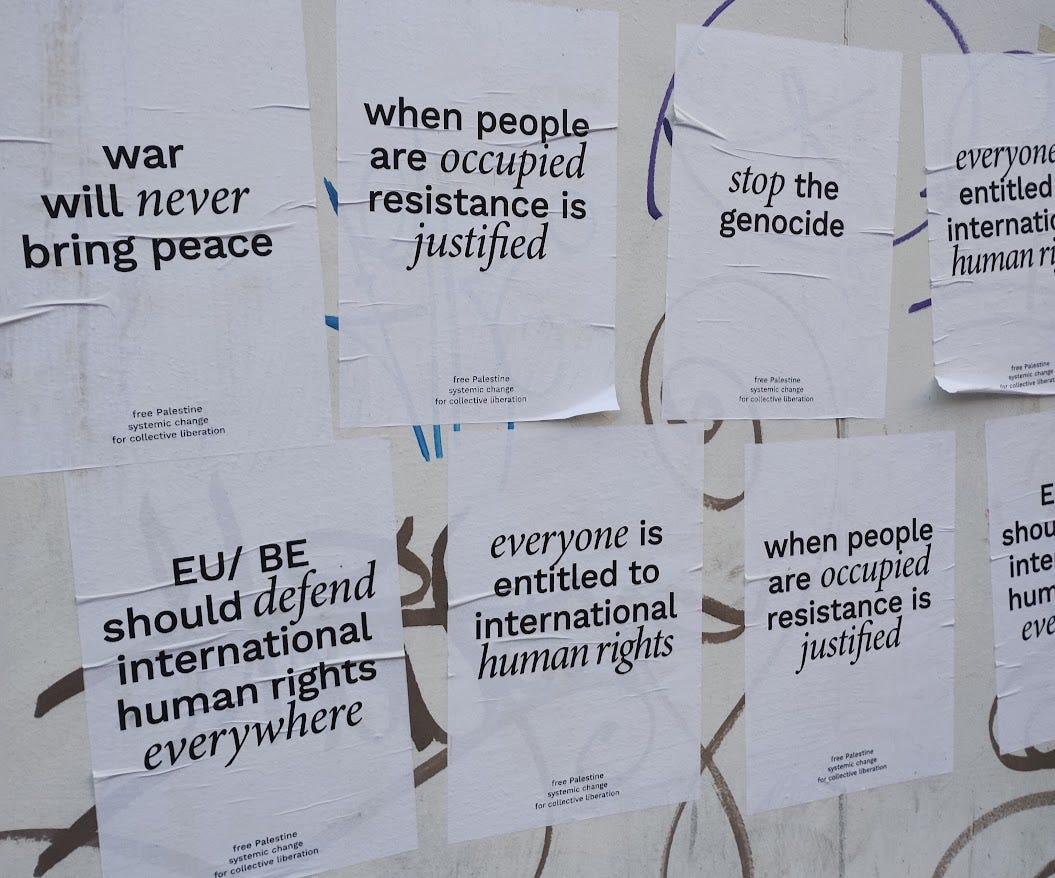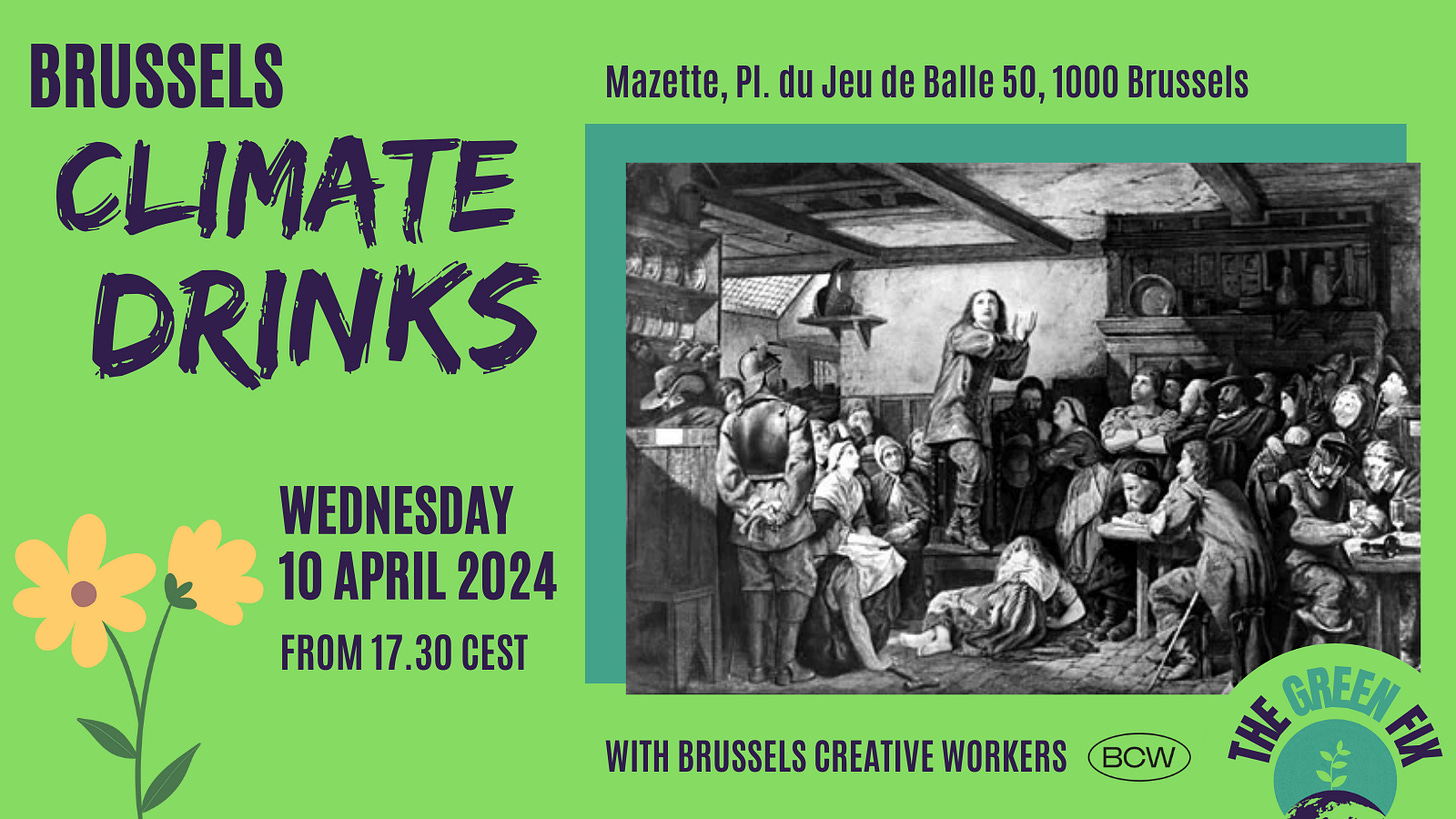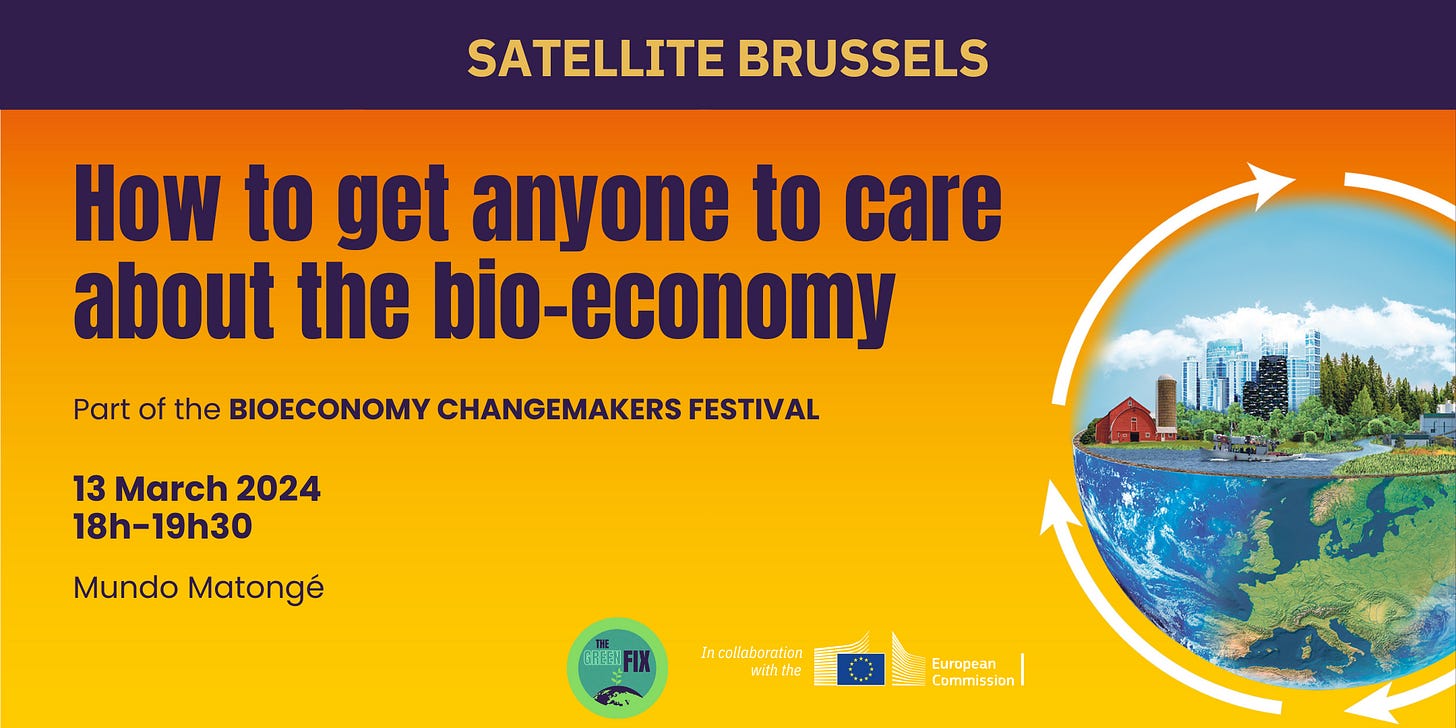I don't want to compromise or 'manage expectations' for justice anymore.
What if we decided that human rights and the environment were no longer up for negotiation?
I’ve been thinking a lot about compromise.
I prefer the Spanish version of the word. Compromiso. In Spanish it means commitment. But it can also be translated as a difficult or complicated situation. This isn’t so far from the English. Who likes being left in a compromised situation?
Juliette Goulet, a degrowth professional, recently posted on LinkedIn about leaving her work at a circular economy NGO because she was tired of settling for working on ‘realistic’ solutions to extreme problems.
“Realistic for who?”
It’s a sentiment that has resonated with anyone else who stared at the ‘Please recycle me!’ message on a Coca-Cola lid and wondered if we’re already living in the Upside Down.
Most of my day job is spent working on EU advocacy campaigns. If I had a euro for every time I heard the words realistic, feasible, or compromise I might be able to afford rent before this city gets too gentrified.
Who doesn’t like compromise, right? It sounds so reasonable. Look how diplomatic and considerate we’re being. Balancing everyone’s needs.
That’s not what’s happening.
Politics has a lot in common with toxic and manipulative relationships. What looks like compromise usually leaves one party at a significant disadvantage.
Emotional manipulation tactics are pretty well-known. From home to the workplace, it’s the same story. Their life is hard, we don’t understand how difficult we’re making it for them, can we stop and be reasonable, can we please calm down? You clearly don’t understand how it works. It’s not their fault. How can you criticise them when you yourself are not perfection personified?
Interesting fact - a common tactic of manipulative people is insisting that interactions happen on their ‘turf.’ The partner that is always too tired to come to your place but you should come to theirs. That manager that schedules themselves into your Monday morning when you wanted to work from home. You’ve begun making sacrifices for them before you’ve even arrived.
By agreeing to abide by a political system that considers environmental health and human rights something that can be negotiated and sacrificed, we’ve already made one of the biggest compromises imaginable.
We live in a political context that demands that we show up at the time and space that they prefer, learn the bureaucratic language and labyrinth of policymaking to frame our request, and then ask that they integrate our demands for justice into their existing system. My colleagues wake up at 7am to stand outside the EU Council building with placards - and need police permission beforehand.
And now we see compromise as success. We have to, to stay sane working in this field. When you’re in a drought, you’ll take any drop of water. When you work in politics you’ll scramble for any concession.
But any decision that contributes to further environmental devastation or injustice is not a compromise, it is a death knell for future victims of corporate exploitation, polluted air and institutional violence. And for what? Who is winning?
Compromising with manipulators rarely ends well. That was probably just another one of our ‘crazy ideas.’ And you can’t compromise with science anyway.
We have the facts and the consensus needed for a swift and rapid fossil-free transition into a society that puts wellbeing first. And we don’t need to ask for permission.
We are volunteer-led! Our content is free but the volunteer time shouldn’t be. If you want to support ou work, we appreciate any donations.
What’s Going On?
The next big climate deadline is for meat and dairy (and it’s soon).
Related: How a general manager of a shrimp processing plant became a whistleblower.Countries are underreporting their emissions to the UN, by a lot.
Related: Fossil fuel producers on track to nearly quadruple output from newly approved projects by decade’s end.EU does U-turn and blocks vote on key law to restore nature.
Related: Farmers return to Brussels and escalate their protest.Climate quitting: the people leaving their fossil fuel jobs because of climate change.
Related: Gig workers around the world speak out against working conditions.The climate crisis is tied to growing rates of psychiatrist disorders.
Useful: Are we all doomed? How to cope with the daunting uncertainties of climate change (by a climate scientist).
A roundup of what we’ve been up to (except for organising a Q&A, clearly)
1. The Brussels Climate Drinks are back!
This is the weirdest networking you’ll do (and no, the networking part is not mandatory). We’re not in the Brussels bubble anymore folks.
Come along 10th April and reserve a free spot here.
Can’t make it on the 10th? We’re also trialling smaller ‘coffee fix’ meetups in Brussels over the next couple of months, for when you’re craving a slower quieter pace (or just want to cowork with cool climate folk).
Follow our socials on Instagram @thegreenfix_ and Twitter @TheGreenFix for details on the next coffee meetups.
P.S Not in Brussels but jealous? Reach out if you want to organise climate drinks or climate meetups where you are! Our email is wearethegreenfix@gmail.com.
2. Activists are burning out all the time. I should know, I’m one of them.
Perfectionism, eco-anxiety and underfunded climate justice campaigns make for a burnout-happy generation of activists (or as I like to call it, we have system sickness).
A couple of weeks ago I had the pleasure of chatting to the team of climate newsletter
about the widespread problem in the NGO and activism world, and my own experience.Check out the full interview:
3. How do you talk about transitioning to a sustainable economy?
In March, the European Commission invited The Green Fix to be part of their Bioeconomy Changemakers Festival, an event organised by some motivated young bioeconomy ambassadors.
If you’re a normal person not trapped in the EU policy bubble, you probably haven’t come across the bioeconomy. The European Commission defines it as ‘using renewable biological resources from land and sea, like crops, forests, fish, animals and micro-organisms to produce food, materials and energy’ and it forms a part of the EU Green Deal.
We’re pretty transparent that our view of a sustainable economy is rooted in degrowth and wellbeing. The concept of nature-as-resource runs the risk of encouraging increasing production and consumption as long as it comes from ‘natural’ sources.
So anyway. Here are our slides and top tips on how to become a more effective ambassador for a post-growth economy bioeconomy.
4. How to Ban Fossil Ads
A collaboration of NGOs organised a #BanFossilAds conference in Brussels last week focused on building the movement to remove advertising for the fossil fuel industry and all fossil-intensive products.
(Feeling bad about flying isn’t that helpful but it’s worse for companies pretend aviation is somehow green).
The full takeaways from the conference are on Instagram (linked in the image) or on my LinkedIn.
Useful resource: The amazing Creatives for Climate network have created a free toolkit for people working in the creative industries that want to use their skills to support positive solutions.
5. So… anyone want to watch me do stand-up comedy?
I keep putting off promoting this because of crippling self-consciousness and also my inability to remember to record the sets but I sometimes do stand-up comedy in Brussels, about the climate crisis and mental health. (Famously hilarious topics).
So anyway.
So Now What Do I Do?
LEARN SOMETHING
Becoming Denizen have a very interesting podcast on what life could look like beyond capitalism.
Working in advertising? Race to Zero are holding a webinar on how the sector can support net zero goals. 11 April at 16h30 CEST.
Read: The artists using digital tools to liberate art stolen under colonialism.
TRY SOMETHING NEW
The Women Peacemakers Fellowship is looking for applicants who focus on issues of gender, peace and conflict for a 2-week residency. Deadline 8 April.
The UN Partnerships Programme is looking for women to share their experiences and perspectives in this survey, open until 14 April.
This very cool NGO is looking for volunteers who want to help revitalise their indigenous language. Apply for their Fellowship by 15 April.
CHANGE THE SYSTEM
Innovate4Nature are looking for nature-positive solutions for a major grant and support. Deadline 5 April.
The UN is accepting applications for their The Climate Champions Youth Fellowship 2024 until the 10th April.
Submit your innovate environmental project to the St Andrews Prize for the chance to receive funding. Deadline 12 April.
Grants are available for journalists wanting to work on projects tracing transparency and governance issues in the Amazon rainforest. Deadline 14 April.
The Green Fix offers low-cost sponsored slots on the newsletter. Learn more by emailing wearethegreenfix@gmail.com.
Stay in the loop
You can follow us on Twitter @TheGreenFix, Instagram @thegreenfix_ and LinkedIn. Connect with Cass on Instagram @cass.hebron and LinkedIn Cass J Hebron.










yes yes yes yes yes yes YES!!!!